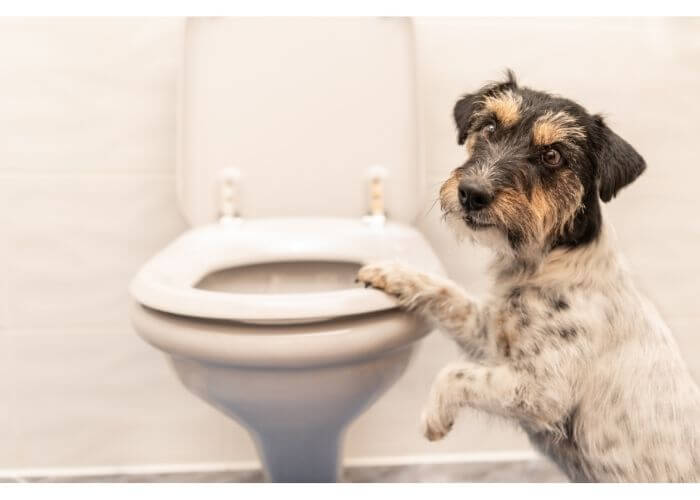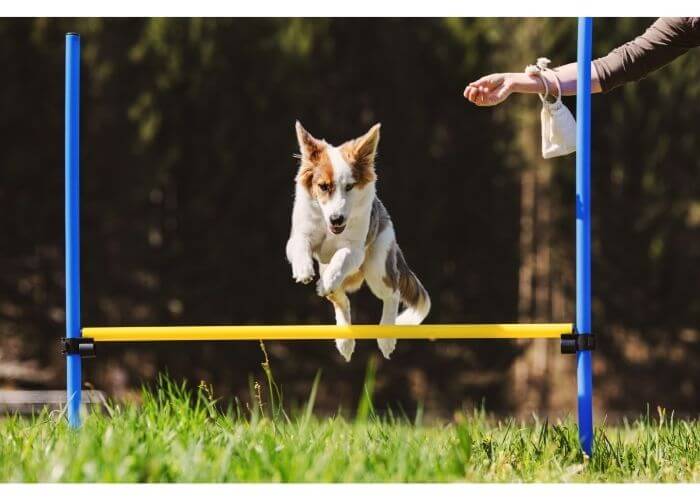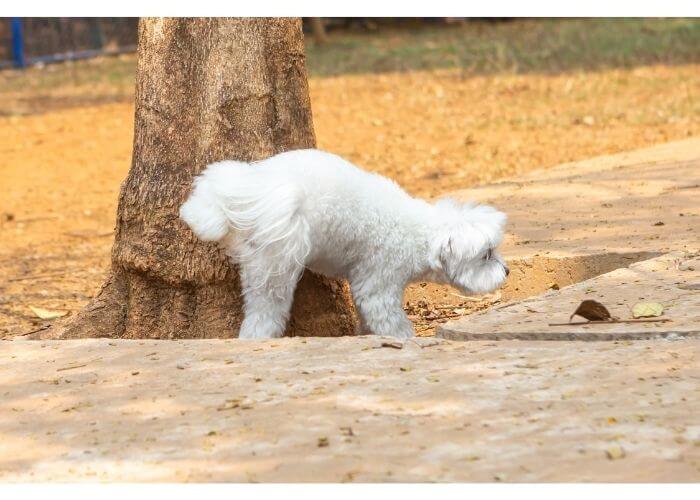In the United States, at least 70 percent of families own pets (cats and dogs). Hence, housebreaking (potty training) is part of the most crucial process for many pet owners.
Call a spade a spade; potty training the most difficult or stubborn dogs is not a walk in the park. That’s not to say that it is impossible to potty train them.
Patience, consistency, love, and determination are, therefore, vital in getting great results. So, how do you potty train a stubborn dog?
Though some breeds, for example, Jack Russell, are the hardest to potty train, it’s possible to potty train any dog. However, health, age, and behavioral problems are reasons why your dog won’t get potty trained. You housebreak a stubborn dog by walking him out after drinking or eating. Stand next to his potty for about 10 to 15 minutes until he poops or pees.
How Do You Housebreak a Stubborn Dog?
With love, patience, and consistency, it’s possible to housebreak even the most stubborn dogs.
Here’s how you housebreak a stubborn dog:
Crate Him
The first thing when potty training your dog is to crate him. While in the crater, give him a potty. Using simple commands, tell him to poop in the potty. Generally, pets have a good memory. Once they know what is needed of them, they’re likely to obey without much pressure.
Once his mind registers that he should poop in the potty, he is likely to poop there even when not in the crater. Just make sure the potty is within reach.
However, don’t leave him in the crater for many hours lest he thinks he is under punishment. A few hours during the day and approximately six hours during the night are enough for him to be in the crater.
Give Him Treats
You definitely know the favorite treats for your dog. Every time he uses the potty well, treat him. Treating him makes him feel good, and will definitely want to obey you all the time.
To make him know why he is being treated, treat him immediately after using the potty well.
Also, mention the potty with excitement so that he knows you’re impressed by his behavior.
Limit the Time He Spends Inside the House
If your pet spends most of the time away from the potty, he is likely to poop anywhere, for instant, on your carpet or couch.
It is, therefore, necessary to restrict his movement around the house.
You can successfully do this by installing the pet gate. One that is foldable is good because you can store it away whenever it’s not in use.
Don’t Give Up
Potty training a stubborn puppy can be frustrating most times as they believe they're the bosses. As such, they do what they think is right, not what you tell them to do.
So, don’t be mad at him. Give him time, keep training him, and applause him.
At What Age Can a Dog Be Fully Potty Trained?
You can start to potty train your dog when he is 6 weeks old. However, dogs can be fully potty trained at 12 weeks. Even so, it takes at least 4 to 6 months to fully housebreak a dog.
For stubborn dogs, it might take even a year to fully potty train.
Nonetheless, several factors also determine at what age to fully potty train, for example, the breed.
Some breeds have smaller bladders, while others have bigger ones.
Smaller breeds have smaller bladders that might get full fast and might need to empty it often. In contrast, bigger breeds such as German shepherds have bigger bladders that don’t need frequent emptying.
So, if you have smaller breeds, start by taking him outside after every 60 minutes. Slowly, he will learn that he ought to poop there anytime he needs to empty his bladder.
As a result, you’ll have fewer, if any, cases of indoor peeing. Remember, though, that this is not full training. For best results, full housebreaking starts at 12 weeks.
What if it is an older adopted dog?
Older adopted dogs can be potty trained as soon as they come to your home. These, however, might need a bit of patience and professional training, especially if it’s a stubborn breed. Lots of treats would also do magic in correcting the wrong habit.
Why Won't My Dog Get Potty Trained?
It can be heartbreaking to deal with one mess after another. One of the reasons why your dog won’t get potty trained is:
Inconsistency
Potty training a stubborn dog is not for the faint-hearted. It needs great consistency.
Here’s what we mean:
If your dog has a small bladder, take him out every 1 hour. You don’t do this for two or five days, then call it over, it can’t work. Do this for at least 3 to 4 months, depending on the breed.
As days go by, it gets embedded in his mind that it is time to pee or poop even before you can take him out.
Lack of Proper Schedule
To properly potty train a stubborn dog, you must have a good feeding schedule that goes hand in hand with a peeing schedule.
Let’s explain:
If you decide to feed your dog after every 8 hours (depending on his age), then be consistent. Don’t change that schedule after one or two weeks unless when it’s necessary.
Otherwise, if there’s no good reason, for example, age or weight, then stay consistent. Once he is done feeding, take him outside to pee or poop.
Do also make it a habit to take him out after long sessions of exercise, and before and after waking up. This way, your dog gets potty trained effectively.
Why Does my Dog Pee in The House after Going Outside?
It’s frustrating! Nevertheless, before you can get mad at your dog for peeing inside just after going outside, know and understand that there are many reasons that could cause this.
To be able to deal with the situation effectively, you need to know and understand why your dog pees in the house after going outside.
Here are some of the major reasons:
Medical Situation
If your dog has had successful housebreak training, but suddenly started peeing inside the house, then he might need an immediate medical check-up.
Some of the probable medical problems include:
- Kidney problem
- Assorted gastrointestinal problems
- Weak urinary bladder
- Addison’s disease or Cushing’s disease, or any other hormonal condition
- Diabetes
- Internal parasites such as hookworms
- Current medication-if under any
Behavioral Problem
If you just started potty training your stubborn dog, it’s likely that he hasn’t overcome the problem yet. His old habit is yet to go away. In this case, you’ll need to be more patient with him and avoid punishing or scolding him.
Apart from this, your dog could be scared of someone or pet they’ve just seen. A scary occurrence in the house could also cause such habits.
So, if your dog pees in the house after going outside, it’s time you look out for body signs that denote he is scared before looking out for other causes such as medical issues.
Signs of being nervous may include:
- Pricked and swiveling ears
- Hunched back or shoulders
- Low ears
- Lowered tail
- Abnormal panting
Age
Aging causes health problems such as forgetfulness in dogs, commonly referred to as dementia.
It doesn’t matter if your dog is stubborn or not; once they suffer from dementia, he may no longer have good control of his urinary tract.
Often, dogs suffering from dementia may forget all the training you’ve given them, hence pee whenever they want, wherever they’ll be.
In this case, there’s nothing much you can do other than try to manage the problem.
You can do this by:
- Buying doggie diapers
- Give him medication or seek advice from the vet on the best supplement
- Line his bedding before he sleeps
Does Vinegar Stop Dogs From Peeing in The House?
Vinegar stops dogs from peeing in the house. Even the most stubborn dogs won’t get near the smell of vinegar. So, if you pour or spray a mixture of vinegar and water (ratio of 1:1) on the areas your stubborn dog poops frequently, you’ll have won the battle against him.
Besides, vinegar is not harmful to your stubborn dog, cat, or yourself. However, if you’re sensitive to smells, vinegar may not be the best solution for you. Even so, it dissipates real fast, so it shouldn’t be a thing to worry about if you can bear just a few minutes.
It’s also eco-friendly. That’s not the best part? Vinegar is cheap, hence economical for use by anyone who wishes to save a coin or two.
Unfortunately, you cannot use vinegar in non-organic areas. So, don’t try it on your garden as it kills plants.
Does Putting Your Dog Nose in Pee Work?
Putting your dog nose in pee may work for some dogs, but not all. But this is also being insensitive! Animals, even the most stubborn dogs, deserve some love. Putting the dog nose in pee is definitely not one of the ways to show love to your buddy.
Dogs whose noses are put in the pee grow with a lot of fear and never bond well with their owners. They might also not potty train in the long last since they’ll always hide from you whenever they want to poop or pee.
Putting your dog nose to pee is a great misconception circulating among new dog owners that consider it as an effective way to punish a stubborn dog that won’t potty train.
What is the Easiest Breed of Dog to Housebreak?
Not every dog is stubborn when it comes to potty training. Some dogs are naturally clean and want to keep their area clean, too.
Such dogs are easy to potty train.
Some of the easiest breeds to housebreak are:
- German shepherds
- Border Collie
- Brittany
- Miniature Schnauzer
- Bearded Collie
- Poodle
- Labrador Retriever
- Boston terrier
- Doberman pinscher
What Are The Most Common Causes Of A Dog Pooping Everywhere?
The most common causes of a dog pooping everywhere include:
- Inconsistency in training
- Being aggressive to him during training sessions
- Lack of adequate training
- Bad weather outside
Is It Safe To Use Puppy Pads For The Stubborn Dog?
Unless you’re planning to visit a friend with your dog, avoid using puppy pads. While puppy pads may be good in certain situations, like when your pup is unwell, they can mess up with all the training you’ve given him.
So, what happens when you use pads on your pup?
His Bladder Weakens
When your dog learns to use pads, his bladder weakens. Consequently, he poops anywhere he wishes. So, whenever he wants to poop, he poops without caring where he is. Before you get to know it, he’ll have messed the whole place.
If he has no medical complications, avoid using puppy pads.
Not Hygienic
Even with a puppy pad, you can be sure that some urine or poop will penetrate through the pad and mess the floor.
Also, puppy pads are not ideal for aggressive breeds. They’re likely to tear the pad if they feel uncomfortable in them.
Assuming that he might have soiled the pad, the whole place is likely to get soiled.
FAQs
How long should I potty train my dog?
There’s no specific time to train your pup. Each dog is created differently. Therefore, one dog might take a few weeks to train while another might need a much longer time.
So, if your dog is a fast learner, he’ll learn fast. If, however, he is a slow learner, bear with him. With time, he’ll understand your language and obey.
What should I do if my dog won’t puppy train?
Rule of thumb, don’t scold him or punish him. That only makes him scared of you, thus making him anxious. In return, he continues pooping wherever he wishes.
In case you find him pooping elsewhere, carry him and take him where his potty is. You can say words such as “Potty here”.
Such words make him understand that that’s where he ought to poop all the time.
As soon as he is done pooping, offer treat to make him know that you’re impressed.


